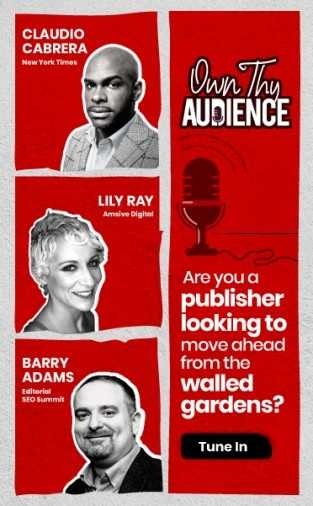According to Search Engine Land, zero click searches rose to 65% in 2020. It's interesting because Google then responded to this claim, alleging it was false, and that, “In reality, Google Search sends billions of clicks to websites every day, and we’ve sent more traffic to the open web every year since Google was first created.”
To put an end to the debate, we decided to call in Chelsey Heath, NEWS SEO strategist at Trisolute Software Corporation, Hisham Khalil, CEO, Content Ventures Investments , Tarek Abougabal, Director of Sales - MENA, iZooto and Nash David, Director of Content Marketing, iZooto. The panel discussed what zero-click content means for publishers, the difference between visibility on Google Search and Google News, how SERP has evolved and much more.
The struggle to be visible on Google
There is no doubt that publishers face immense competition when trying to feature on any of Google’s platforms such as Search, Discover, etc. Tarek who runs a sports website, WTSKora in the MENA region, spoke on how almost 80% of Google’s top stories there consist of sports and for him to rank amongst all the competitors is extremely difficult. Top it by the fact that there isn’t any guideline available on how Google operates and that just makes things tougher for a small publisher like him.
An old study by Ahrefs concludes that the first result on Google gets around 30% of clicks, but the moment it turns into a featured snippet it drops down to under 10%. Is becoming a feature snippet on Google more of a curse than a blessing?
Chelsey answered this by accepting how frustrating it can be for a publisher to put in all the effort and not get anything substantial from it. Her experience working as a NEWS SEO Strategist and consulting publishers over the years has taught her that pivoting the same content and presenting it in a different way that lets users gain more value from it works well too.
How are publishers affected?
Hisham Khalil, who runs Btolat in the Middle East, crossing a monthly traffic of 30M, suggested that publishers who are dependent on Schema, for example, recipe websites, would have a higher impact of zero-click search. There is a huge chance of them down-sizing and eventually shutting down if users don’t click through.
Tarek added to the concern, that if both large and small publishers are complaining about the same thing, it is scary. He added how as a small publisher he’s now looking on to social media for traffic.
Tarek posed the same question to Chesley, asking if her side of the world faces the same problem.
She agreed to the fact that it is comparatively harder on small publishers, especially if a large publisher is visible on multiple spots like Discover, Google News, top stories, etc. However, Chesley had a different view of borrowing traffic from Meta, given how it had disappointed publishers earlier, forcing them to depend on Search for traffic.
Top 3 Learnings from the conversation
Build brand authority
Change the way you think about appearing on feature snippets. As long as you are getting credited, and are able to establish brand authority, it is good. If search users constantly see your brand, they know that you have the content. It also helps you build topic authority from Google.
Look to associated keywords/topics
Add more insights to the content. For example, sports websites should add analysis about the game apart from just adding the scores, or stating who’s playing or who won. Something additional about the topic that raises your chances of getting a click, and also helps you build out your content.
Explore different content formats
Chelsey advises to broaden your content formats, if you have written a detailed explainer piece it would be a good idea to create an explainer video as well. This video would then actually show up on SERP and increase your chances of getting a click.
They summarised the conversation by emphasising on being more present, so users start associating you for a given topic and it then leads to clicks. Chelsey also pointed out that publishers at some point have to ask themselves - what are our goals, what do we want, and sometimes it might not align with Google. She tells publishers, just because Google is doing something a certain way does not mean you have to follow suit. Look at what it is that your audience really wants, and work on editorial strategies.
You can listen to the conversation further in depth, learn more about the strategies and the differing views of an SEO expert and a large and a small publisher here.






